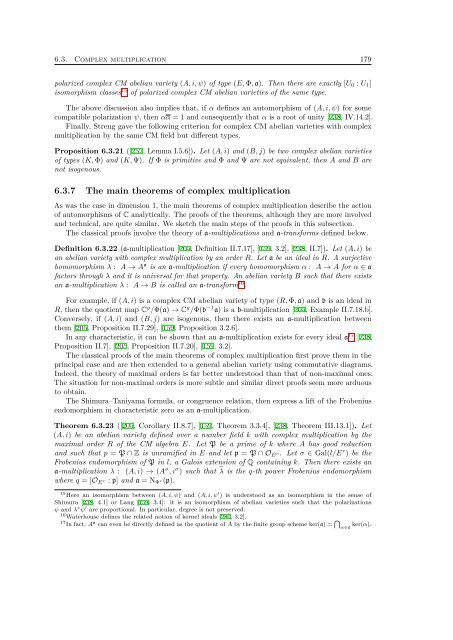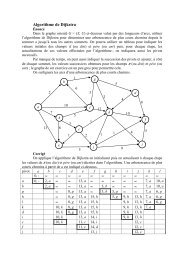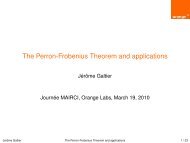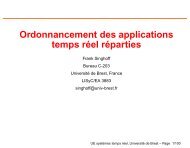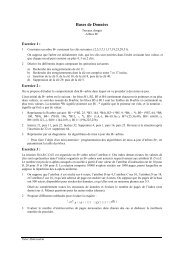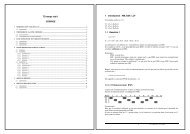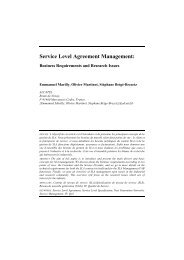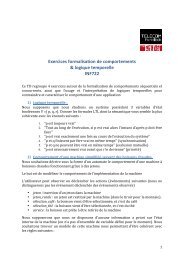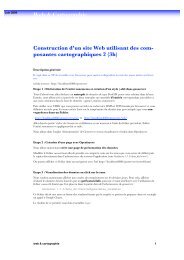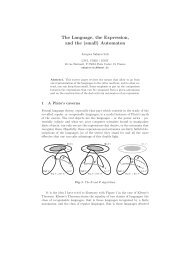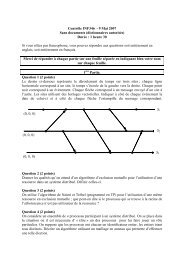here - Sites personnels de TELECOM ParisTech - Télécom ParisTech
here - Sites personnels de TELECOM ParisTech - Télécom ParisTech
here - Sites personnels de TELECOM ParisTech - Télécom ParisTech
Create successful ePaper yourself
Turn your PDF publications into a flip-book with our unique Google optimized e-Paper software.
6.3. Complex multiplication 179polarized complex CM abelian variety (A, i, ψ) of type (E, Φ, a). Then t<strong>here</strong> are exactly [U 0 : U 1 ]isomorphism classes 15 of polarized complex CM abelian varieties of the same type.The above discussion also implies that, if α <strong>de</strong>fines an automorphism of (A, i, ψ) for somecompatible polarization ψ, then αα = 1 and consequently that α is a root of unity [238, IV.14.2].Finally, Streng gave the following criterion for complex CM abelian varieties with complexmultiplication by the same CM field but different types.Proposition 6.3.21 ([252, Lemma I.5.6]). Let (A, i) and (B, j) be two complex abelian varietiesof types (K, Φ) and (K, Ψ). If Φ is primitive and Φ and Ψ are not equivalent, then A and B arenot isogenous.6.3.7 The main theorems of complex multiplicationAs was the case in dimension 1, the main theorems of complex multiplication <strong>de</strong>scribe the actionof automorphisms of C analytically. The proofs of the theorems, although they are more involvedand technical, are quite similar. We sketch the main steps of the proofs in this subsection.The classical proofs involve the theory of a-multiplications and a-transforms <strong>de</strong>fined below.Definition 6.3.22 (a-multiplication [205, Definition II.7.17], [159, 3.2], [238, II.7]). Let (A, i) bean abelian variety with complex multiplication by an or<strong>de</strong>r R. Let a be an i<strong>de</strong>al in R. A surjectivehomomorphism λ : A → A a is an a-multiplication if every homomorphism α : A → A for α ∈ afactors through λ and it is universal for that property. An abelian variety B such that t<strong>here</strong> existsan a-multiplication λ : A → B is called an a-transform 16 .For example, if (A, i) is a complex CM abelian variety of type (R, Φ, a) and b is an i<strong>de</strong>al inR, then the quotient map C g /Φ(a) → C g /Φ(b −1 a) is a b-multiplication [205, Example II.7.18.b].Conversely, if (A, i) and (B, j) are isogenous, then t<strong>here</strong> exists an a-multiplication betweenthem [205, Proposition II.7.29], [159, Proposition 3.2.6].In any characteristic, it can be shown that an a-multiplication exists for every i<strong>de</strong>al a 17 [238,Proposition II.7], [205, Proposition II.7.20], [159, 3.2].The classical proofs of the main theorems of complex multiplication first prove them in theprincipal case and are then exten<strong>de</strong>d to a general abelian variety using commutative diagrams.In<strong>de</strong>ed, the theory of maximal or<strong>de</strong>rs is far better un<strong>de</strong>rstood than that of non-maximal ones.The situation for non-maximal or<strong>de</strong>rs is more subtle and similar direct proofs seem more arduousto obtain.The Shimura–Taniyama formula, or congruence relation, then express a lift of the Frobeniusendomorphism in characteristic zero as an a-multiplication.Theorem 6.3.23 ([205, Corollary II.8.7], [159, Theorem 3.3.4], [238, Theorem III.13.1]). Let(A, i) be an abelian variety <strong>de</strong>fined over a number field k with complex multiplication by themaximal or<strong>de</strong>r R of the CM algebra E. Let P be a prime of k w<strong>here</strong> A has good reductionand such that p = P ∩ Z is unramified in E and let p = P ∩ O E r. Let σ ∈ Gal(l/E r ) be theFrobenius endomorphism of P in l, a Galois extension of Q containing k. Then t<strong>here</strong> exists ana-multiplication λ : (A, i) → (A σ , i σ ) such that ˜λ is the q-th power Frobenius endomorphismw<strong>here</strong> q = [O E r : p] and a = N Φ r(p).15 Here an isomorphism between (A, i, ψ) and (A, i, ψ ′ ) is un<strong>de</strong>rstood as an isomorphism in the sense ofShimura [238, 4.1] or Lang [159, 3.4]: it is an isomorphism of abelian varieties such that the polarizationsψ and λ ∗ ψ ′ are proportional. In particular, <strong>de</strong>gree is not preserved.16 Waterhouse <strong>de</strong>fines the related notion of kernel i<strong>de</strong>als [280, 3.2].17 In fact, A a can even be directly <strong>de</strong>fined as the quotient of A by the finite group scheme ker(a) = ⋂ α∈a ker(α).


